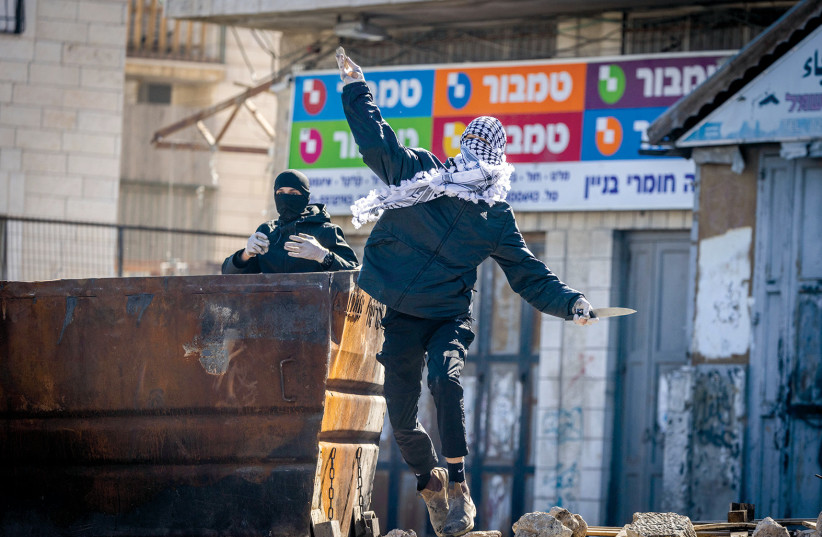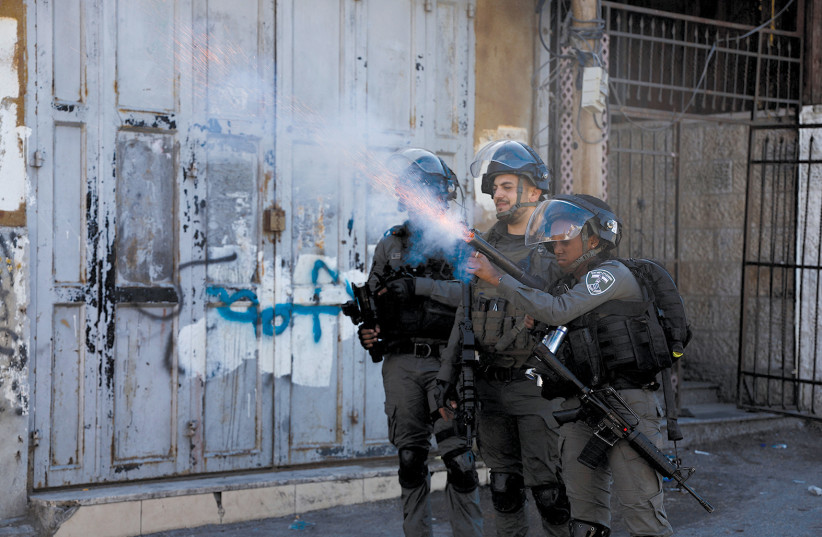On Saturday evening, Palestinian activists and heads of families in the Shuafat refugee camp in east Jerusalem announced that on the following day they would start a “civil uprising” that would include a general strike. Workers would not be allowed to work in the areas of the Green Line (including the western side of the city); entrances to the camp would be blocked; taxes and other mandatory payments to the Israeli authorities and the Jerusalem Municipality would not be paid. The measures were taken in protest against the increased police activity in the camp in recent days, which protesters described as harassment.
Activists in the refugee camp said that this vindictive harassment is implemented by the police under the pressure of National Security Minister Itamar Ben-Gvir. Ben-Gvir was not able to convince Prime Minister Benjamin Netanyahu to go to Guardian of the Walls 2 in Jerusalem – referring to the May 2021 war with the Hamas terror group in the Gaza Strip that sparked ensuing riots between Jews and Arabs in Israeli cities.
But by Monday morning, there were already over 100 checkpoints in most of the neighborhoods in east Jerusalem – something not seen there for a while. Representatives of three other east Jerusalem neighborhoods – Isawiya, Jabal Mukabar (where there was also intensive police activity last week) and Anata – announced that they would join the protest.
However, by Sunday evening it was clear that there wasn’t a large response to joining the strike and the protest measures, so the plan didn’t succeed. This does not mean, of course, that the winds are no longer turbulent in the Palestinian neighborhoods and that continued unrest is not expected.
Is east Jerusalem on the verge of another conflagration?
Are we reaching another period of clashes and terror attacks which, for the first time in a long time, are carried out in an unorganized manner by Arab residents of the city? With the period of Ramadan about a month away, will Jerusalem residents face a wave of terrorism and a deterioration in the fragile coexistence between parts of the city?

In addition, recent terrorist attacks have been perpetrated by boys aged 13 and 14, and what we are now facing will be known as “the terror of the children,” since one of the most prominent aspects of the current wave of terrorism in Jerusalem is the young age of the terrorists. These Palestinian teenagers from the east of the city are influenced by incitement on social networks and the content taught in schools, mosques and, above all, the blunt and violent messages on social media.
The profile of the young attackers makes it difficult for authorities to thwart the attacks. Experts agree that young teenagers intent on murdering Jews grow up in a violent and inciting society that brainwashes them with hatred of Israel.
“This needs to be taken care of,” declared Finance Minister Bezalel Smotrich following the stabbing in the Old City three weeks ago.
Parents in the eastern sector of the city feel helpless, and they fear heavy-handed responses by the security forces. They also worry that if they oppose the actions, they may be accused of complicity with the Israeli establishment.
“Their heads are filled with stories of heroism and honor if they become martyrs. They are children – it’s easy to seduce them with these stories. They don’t really understand.”
Zohir
Palestinian terrorists are young and parents in east Jerusalem feel helpless
ZOHIR, WHO was born and lives in A-Tur, has been working most of his adult life in west Jerusalem, with Jews. He says most of his relatives and neighbors are very worried about the incitement from the Arab sector and the retaliation from the Israeli side whenever something bad happens.
“We have all lost control over the children, largely due to the influence of the [social] networks, but not only. Some people manipulate these children. My nephew, 13, started going to the mosque every day with his friends, where an imam incited them, giving them all kinds of things to entice them to come, and then sends them to do bad things, with a knife or something like that.
“My brother found out about this, went to the mosque and threatened this imam, and also warned our neighbors. It has stopped, for now, and he is careful. But how many more are there? Who knows about them? Who checks what they say to these young people walking around the street?
“Their heads are filled with stories of heroism and honor if they become martyrs. They are children – it’s easy to seduce them with these stories. They don’t really understand.”
All this is happening precisely at a time when large budgets are being directed to improve the infrastructure and living conditions in all the neighborhoods in the eastern part of the city. Just this week, Mayor Moshe Lion inaugurated the largest and most elaborate urban park in the east of the city. He was proud that the improvement during his tenure has fundamentally changed the conditions of life in east Jerusalem.
Residents in the neighborhoods adjacent to the Wadi Joz park did express approval of the park and its facilities but stated that the park eliminates the last chance to expand the eastern neighborhoods of the city.
“We will have a beautiful park for a picnic,” said one resident bitterly. “Maybe when Ben-Gvir will order to destroy the house we had to build without a license we could not obtain, we will set up a tent there for the family.”
Meanwhile, at Safra Square, there seems to be a dramatic change in relation to the residents of the east Jerusalem. Last week, it was decided to fire the widow of terrorist Ayah Kraka, even though the police investigation did not establish that his wife knew about her husband’s intentions or was a partner in his plan. The woman, a consultant for the education administration for the eastern part of the city, is currently on maternity leave. Nevertheless, the municipality requested a dismissal approval, as required in the case of the dismissal of a pregnant or maternity-leave worker.
Sources in the municipality add that the decision was made at the highest levels of the municipality and that nobody bothered to inform the director of Manhi for the Arab sector of the decision. The sources could not explain what caused the change, but some point to the increased presence of the national security minister at the scene and his demand to increase the rate and extent of demolishing illegal buildings in the east of the city.
A municipal spokesman said: “The municipality turned to the commissioner of the women’s labor law to request permission to hold a hearing for the employee in order to terminate her employment. The employee has not yet been fired, and the issue is under consideration.”

IN THE past, police often refrained from demolishing homes, since it could be a catalyst for disturbances. Now, say sources at Safra Square, the district commander will have to decide whether to back up Ben-Gvir’s policy even in the month of Ramadan or wait until the end of the tense period.
“The connection that Ben-Gvir made between the fight against terrorism and the demolition of illegal buildings is a disaster. We all understand that this is a mistake, but this is an order from above. It is already clear that it does not work to calm spirits. Why connect a violation of building laws with terrorism? What is the connection? Whom does it serve?”
Senior anonymous municipality official
“The connection that Ben-Gvir made between the fight against terrorism and the demolition of illegal buildings is a disaster,” says a senior official at the municipality, who requested anonymity. “We all understand that this is a mistake, but this is an order from above. It is already clear that it does not work to calm spirits. Why connect a violation of building laws with terrorism? What is the connection? Whom does it serve?”
David Koren, CEO of the Jerusalem Institute for Policy Research and former adviser to the mayor for the eastern sector of the city, says that social networks, which are unsupervised, are the main reason that young people are drawn into the circle of terrorism.
“This is mainly about texting, of course, but even more so, on the TikTok, Telegram network, and also on WhatsApp – where it is almost impossible to monitor and prevent the transmission of harsh messages there. The violence on these networks is unfathomable, and there is strong and blatant encouragement to harm Jews.”
“This is mainly about texting, of course, but even more so, on the TikTok, Telegram network, and also on WhatsApp – where it is almost impossible to monitor and prevent the transmission of harsh messages there. The violence on these networks is unfathomable, and there is strong and blatant encouragement to harm Jews.”
David Koren
Regarding the question of how this is possible, as more and more schools choose the Israeli curriculum, Koren explains that although there is an increase in the number of these schools, the numbers are still small.
“There is a profound influence that operates according to political affiliation. Some [neighborhoods] are under the influence of Hamas, some are under the influence of the jihadist elements, and some others are more connected to the Palestinian Authority.
“But there is a strong influence even in the schools that work according to the Israeli programs – all the textbooks come from the PA. It is true that the municipality removes the inciting parts, but how can you know what a teacher is saying in class?”
“We have lost control over our children.”
Some Old City of Jerusalem shop owners
On Sunday morning, in the Old City alleys, shop owners acknowledged that “we have lost control over our children.” The phenomenon affects most families in the city, they say, in all streams of political affiliation, from Hamas supporters to PA supporters.
“This is something we didn’t know in my time,” says Fawaz, who owns a souvenir shop in the Old City. “I wouldn’t take a single step without my father’s permission. But today, these kids don’t ask us at all. They are all connected to their smartphones, to act under the influence of social media.” ❖
